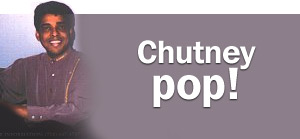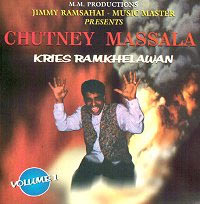Home > News > Specials
The Rediff Special/M D Riti
February 18, 2003

"In Surinam, we wish ek aisa mazab banaya jaye, jahan insaan ko insaan banaya jaaye," says chutney singer Krieshen Ramkhelawan. In other words, Ramkhelawan mirrors the sentiments of almost every Indian when he wishes there could be a religion that makes mankind more humane.
Ramkhelawan, 44, toured India last month with his repertoire of about 500 songs, of which more than half are based on his own lyrics. His inspiration for writing comes from day-to-day life. His experiences, perceptions and personal philosophy make it possible for him to deliver a message in the form of a song.
Accompanying him on the tour were his father Ramprasad Khelawan and two friends, Kries Poeran and Rajes Sewnandan. The musical group from Surinam came to India mainly to participate in the Pravasi Bharatiya Divas event .
"Chutney music, which derives its name from the Indian food dip, is not much known outside the Caribbean," explains Ramkhelawan. "The Surinamese version of chutney, which the locals describe as a hot, spicy appetiser, is made with plenty of hot peppers and sour fruits. Chutney music is basically a singing art form indigenous to Trinidad and Tobago and is popular for its hot, spicy rhythm. It was originally made popular by a group of ladies having a good time at weddings, births or get-togethers.
"I have enjoyed singing all over the country," Ramkhelawan told rediff.com when he visited Bangalore as a part of his Indian tour.
The concert saw him in full form -- in black trousers, dress shirt decorated with a long patch of glittering golden fabric and black jacket. His voice quavered in places, but he sang at full volume. "I am so happy to have Papaji here with me," he said, gratefully acknowledging his father Ramprasad Ramkhelawan who regaled the audience with two solo songs.
 Chutney selections are sung on all sorts of subjects. They represent a kind of fusion music in which there are English and Hindi lyrics. Sundar Popo is known as the father of chutney music, ever since he made his debut in 1971 with Nanie and Nana. No one before him had dared to mix the racy rhythms of Indian folk songs with the pulsating vibrations of the soca, the beat of the calypso and the strains of the dholak.
Chutney selections are sung on all sorts of subjects. They represent a kind of fusion music in which there are English and Hindi lyrics. Sundar Popo is known as the father of chutney music, ever since he made his debut in 1971 with Nanie and Nana. No one before him had dared to mix the racy rhythms of Indian folk songs with the pulsating vibrations of the soca, the beat of the calypso and the strains of the dholak.
Ramkhelawan is well known as a chutney, baithak gana and qawali singer, specialising in ghazals, bhajans and nirguns. "I start my day with a prayer and yoga," he says, describing his daily routine back home in Surinam. "After that, I get the kids (Krieshen 21, Avinash 18, Kamlesh 13 and Prya 11) ready for school. I spend the rest of the day in my shop, Amrish Store, which sells music cassettes, CDs, saris, puja requisites and household products."
All his children are musically talented. Krieshen and Kamlesh sing and act in plays, while Prya knows to dances the Kathak. Avinash loves music and is still exploring that field. "But I make sure my children do well in school," he says. "I don't know about other countries, but an artiste cannot live on his music in Surinam for sure!"
Recalling the evolution of his interest in music, Ramkhelawan says: "As a boy, I used to go to the temple a lot. When I turned 12, I began singing bhajans there. My interest in music grew steadily and I stopped studying after high school to pursue music."
Saramacca, the Surinam district in which he grew up, did not boast of wonderful education either. Over the next many years, Ramkhelawan pursued his career in music seriously. His first hit album, released in 1975, had four baithak gana tracks.
Ramkhelawan is mainly interested in music styles that are fading away. "I hate those music styles and songs which are full of swearing," he admits rather quaintly. He released his first qawali album in 1981. It went on to become very popular. This inspired him to take the next step and start singing in Bhojpuri, as this style of music was almost forgotten in Surinam. This led to another hit album, Bhojpuri Bahaar.
"Bhojpuri is now a well known music style all over the Caribbean," he says. "I always try to reach out to a broad audience by singing in a variety of styles." He has even finished a three-year course in classical vocals at the Indian Cultural Centre there. However, he does not perform much in Surinam.
Design: Dominic Xavier
The Rediff Specials